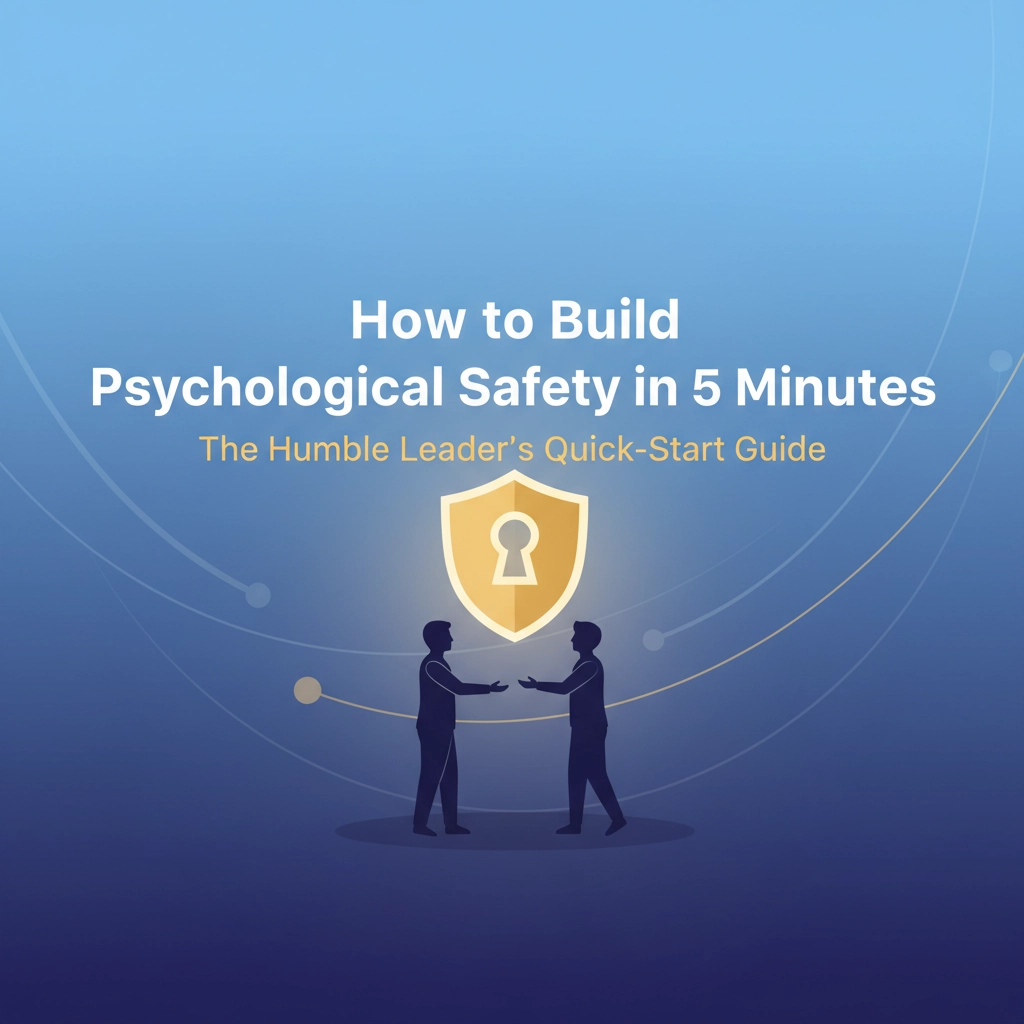How to Build Psychological Safety in 5 Minutes: The Humble Leader's Quick-Start Guide

Are you struggling with team members who stay quiet in meetings, avoid sharing ideas, or seem hesitant to speak up when something's wrong? You're not alone. The missing piece might be psychological safety, and the good news is, you can start building it right now, in just five minutes.
Psychological safety is the belief that you won't be punished or humiliated for speaking up with ideas, questions, concerns, or mistakes. When your team feels psychologically safe, they're more likely to share insights, ask questions, and engage in open discussions. This leads to better problem-solving, creative thinking, and decision-making.
However, here's what most leaders get wrong: they believe that building psychological safety requires lengthy training programs or complex initiatives. The truth? Humble leaders can make an immediate impact with just a few minutes of intentional action.
Your 5-Minute Foundation: Three Immediate Actions
Ready to transform your team dynamics starting today? Here are three actions you can take in your very next interaction:
Start with Vulnerability (60 seconds)
Begin your next team meeting or one-on-one by acknowledging something you don't know or a recent mistake you've made. This isn't about undermining your authority; it's about modeling that it's safe to be imperfect.
Try saying something like: "I realized I made an assumption about our client's priorities without checking with them first," or "I'm still figuring out the best approach for this project, and I'd love your thoughts."
This creates an environment where individuals feel secure and comfortable expressing their thoughts, ideas, and concerns without fear of negative consequences.

Ask One Powerful Question (2 minutes)
Replace your typical status updates with curiosity-driven questions. Instead of asking "What's your progress?" try:
- "What's one thing we're not talking about that we should be?"
- "Where do you think I might be missing something?"
- "What would you do differently if you were in my position?"
This simple shift from telling to asking demonstrates that you value diverse perspectives and are open to being challenged. Spend the full two minutes listening, really listening, to the responses without jumping in with solutions.
Practice the Pause (2 minutes)
When someone shares a concern, idea, or admits a mistake, resist your natural urge to immediately respond with solutions or judgment. Instead, take a deliberate 10-second pause and respond with:
- "Tell me more about that."
- "Help me understand your thinking."
- "What else should I know about this situation?"
This creates space for open communication and shows that all team members are treated with dignity and appreciation for their perspectives.
Understanding the Four Stages of Psychological Safety
Are you wondering how psychological safety actually develops? It happens through four progressive stages that you, as a humble leader, can accelerate:
Stage 1: Inclusion Safety
This focuses on creating an environment where individuals feel valued and included. You're actively seeking diverse perspectives and fostering a sense of belonging among team members. Ask yourself: Does everyone on my team feel like they truly belong here?
Stage 2: Learner Safety
Here, you're encouraging continuous learning and growth, promoting curiosity, experimentation, and constructive feedback. Your team members can develop their skills without fear of failure. The question becomes: Are people comfortable not knowing something and asking for help?
Stage 3: Contributor Safety
Now you're empowering individuals to share their insights and ideas freely. All contributions are encouraged and appreciated, regardless of hierarchical positions. Consider this: Do people feel confident in sharing their unique perspectives and ideas?
Stage 4: Challenger Safety
This final stage enables team members to speak up and challenge the status quo when they see opportunities for improvement. They can respectfully disagree with decisions and suggest better approaches.

The Humble Leader's Essential Mindset Shifts
Are you ready to transform how you show up as a leader? Here are the key mindset shifts that will accelerate psychological safety:
From Expert to Chief Learner
Rather than positioning yourself as the expert who has all the answers, embrace being the chief learner who asks the best questions. Your role isn't to have all the solutions; it's to create conditions where the best solutions can emerge from your team.
From Blame to Curiosity
Replace blame with curiosity by shifting your language. Instead of "Why did this happen?" try "What can we learn from this situation?" This approach reduces stress and anxiety levels, as individuals feel supported and valued, resulting in higher job satisfaction and increased engagement.
From Control to Facilitation
Instead of controlling every conversation and decision, focus on facilitating great discussions. Your job is to draw out the wisdom that already exists in your team.
Sustaining Momentum Beyond the First Five Minutes
Building psychological safety is never something you can "check off your list." It's always changing and evolving based on the actions and interactions of everyone on your team. As a manager, you set the tone, and others will naturally follow your lead.
Make It Consistent, Not Perfect
The key is consistency in small actions rather than grand gestures. Research consistently shows that teams with high levels of psychological safety exhibit better collaboration, communication, and problem-solving abilities.
Focus on:
- Acknowledging good questions, even when you don't have answers
- Thanking people for bringing up concerns or challenges
- Following up on ideas and feedback people share
- Being transparent about your own learning process
Watch for the Signs
How do you know if it's working? Look for these indicators:
- People ask more questions in meetings
- Team members challenge ideas respectfully
- Mistakes are shared quickly rather than hidden
- Innovation and creative problem-solving increase
- People seem more energized and engaged

Common Obstacles and How to Navigate Them
Are you encountering resistance or setbacks? That's normal. Here's how to handle the most common challenges:
"My team seems hesitant to open up"
Remember, they're testing to see if it's really safe. Keep modeling vulnerability and curiosity. It might take several consistent interactions before they trust that the environment has truly changed.
"I'm worried about losing authority"
Humble leadership actually strengthens your influence. When people feel safe to bring their best thinking to you, they're more likely to follow your lead because they trust your judgment and feel heard.
"We don't have time for all this relationship stuff"
Psychological safety isn't separate from productivity; it's what enables it. Teams with high psychological safety perform better, make fewer costly mistakes, and solve problems faster.
Your Next Steps
Ready to put this into action? Here's your simple plan:
- Today: Try all three 5-minute actions in your next team interaction
- This week: Practice the humble leader mindset shifts in every meeting
- This month: Start noticing and celebrating the signs of growing psychological safety
Remember, when team members feel safe to express themselves without fear of judgment or retribution, they engage in constructive debates, share information openly, and provide feedback that leads to better outcomes. Your role as a humble leader is to create and maintain this environment where people feel comfortable bringing their full, authentic selves to work.
The most successful leaders aren't the ones who have all the answers: they're the ones who create conditions where the best answers can emerge. You have the power to transform your team's dynamics, starting with just five minutes of humble, intentional leadership.
Key Takeaways:
- Psychological safety can be built immediately through small, consistent actions
- Vulnerability, curiosity, and active listening are your most powerful tools
- Focus on being a chief learner rather than the expert with all the answers
- Consistency matters more than perfection
- The investment in psychological safety pays dividends in team performance and engagement
Are you ready to become the humble leader your team needs? The next five minutes could change everything.
Coach Chando | Chad Blando
Executive Coach • Adjunct Professor • Author • Leadership Strategist
30+ years in leadership & management coaching.
Author of Sinking the Showboat: How to Coach Oneself in the Art and Passion of Humble Leadership.